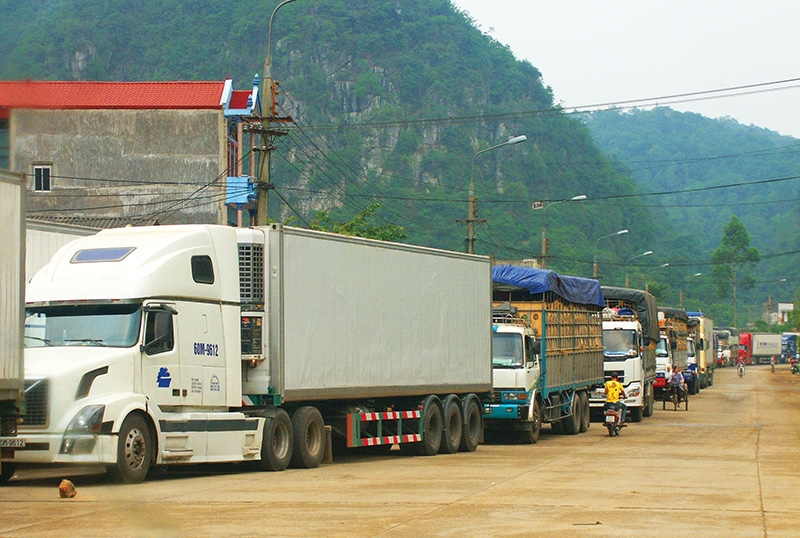Agri-stakeholders mobilise to weather virus outbreak
 |
| Border trade has been seriously curtailed in recent days due to the uncertain nature of the coronavirus spreadPhoto: Le Toan |
After an emergency meeting of the leaders of the Ministry of Agriculture and Rural Development (MARD) on January 31, the MARD sent an official dispatch to key areas producing agricultural items. All localities now have to review the structure of fruit products according to specific details such as season and plant type.
“We have also asked leading processing enterprises to increase purchasing, preliminary processing, and storage,” Nguyen Quoc Toan, director of the MARD’s Agricultural Processing and Marketing Department told VIR.
According to Toan, early next week, the ministry will work with supermarket systems to boost domestic consumption. “We will also propose that the Ministry of Industry and Trade (MoIT) work with the Vietnam Logistics Business Association to promote the warehouse systems of these businesses, especially cold storage, to share farmers’ difficulties,” he said.
As a unit keeping a close watch on the development of the coronavirus, the Agency of Foreign Trade under the MoIT has been asking local businesses to think of different kinds of shipments to utilise for agricultural exports to China.
The agency informed that border gates in Pingxiang of Guangxi province, which borders the northern province of Lang Son in Vietnam, would close until February 8, except for the Friendship Pass which would open on February 3, to prevent the epidemic from spreading.
“Traffic as well as cross-border transportation of goods between Vietnam and China might be affected,” said an agency representative. “We will keep providing updates on the epidemic and its impacts on import-export activities. But enterprises must also regularly discuss with their partners in China to remain updated on any changes to the epidemic while continuously seeking for new markets.”
Over the last few days, dozens of farming households in Binh Tan district in the southern province of Vinh Long have been fidgety over the halt of border trade due to the coronavirus outbreak. “Our partners from China have already stopped buying purple sweet potatoes because of the outbreak, and they cannot confirm when they will start trading again,” said Son Van Luan, chairman of Ngoc Thanh Agricultural Service Co-operative in the district’s Thanh Trung commune.
Binh Tan district is the biggest area planting purple sweet potatoes, which are exported to China. Luan said that normally his co-operatives export dozens of tonnes of the products to China each day. “This makes us worried because this product is not a favourite in the domestic market,” he said.
Meanwhile, Nguyen Thi Hong Thu, director of Chanh Thu Co., Ltd., specialising in the export and import of fruit, said that a lot of the products, especially dragon fruit, have been returned to Hanoi. “We are suffering huge losses with a large inventory. We need the support of the government, and other businesses and partners to overcome our difficulties,” she said.
Vina T&T Group is also among the companies impacted by the epidemic. All trade activities of agricultural products like fruit and vegetables with short preservation time have been ceased. Moreover, their price has also dropped.
Nguyen Dinh Tung, CEO of Vina T&T Group, said that the price of red dragon fruit has dropped from VND40,000 ($1.70) per kilogramme before Lunar New Year to VND4,000 (17 US cents) per kg now.
“Dragon fruit can only be preserved for a short duration, so we have to sell them as quickly as possible. Additionally, the price of mango, rambutan, durian, jackfruit, which can be preserved for less than 15 days, has also dropped sharply. Only fruits with a longer preservation time are not affected because they can be put into cold storage until the border gates open,” said Tung.
He also expressed worries that the plan for the border gates to re-open on February 9 could change because of the further spread of coronavirus. The disease is also impacting the European and North American markets because people from those areas stop travelling and shopping, thus affecting the consumption of numerous goods.
Talking with VIR, Toan from the Agricultural Processing and Marketing Department said that state management agencies and the local agricultural departments have been asked to closely monitor the situation in each key district and locality.
“The spirit is not one of rescuing but of sharing to ensure the market’s future and this is an opportunity for businesses to improve their capacity, focus on processing, and strengthen links between farmers and purchasing businesses,” he added.
| Nguyen Quoc Toan - Director, Agricultural Processing and Marketing Department
The Chinese government lengthened the Lunar New Year holiday until February 2, while many Chinese enterprises let workers have days off until the middle of the first month in the lunar calendar. People are being prevented from entering typically crowded places like restaurants, so the food demand has decreased. Wholesale markets in China like those in Chiang-nan or Yunnan and along the border, the popular way of trade between Vietnam and Guangxi, will be closed until February 8 so trade will be limited until then. This has led to the fact that some Chinese agricultural importers that provide for Wuhan city, like Hong Tai Yang which imports 40 per cent of dragon fruit from the southern province of Long An, have cancelled orders of about 300 containers, equal to 6,000 tonnes. It is expected that about over 21,500 tonnes of dragon fruit will be harvested until February 8, 54,000 tonnes for the period from February 8 to 28, and 10,000 tonnes in early March. International border gates will operate normally from February 3 which means that goods can be exported to China but the wholesale markets are not open until February 8, which will create a bottleneck. This is why we will focus on diversifying markets. In mid-February, a delegation will go to Dubai to deploy activities to expand the market. It is forecast that the local supply situation of dragon fruit will be in difficulty. Besides this, the cold storage system in some key localities, particularly in the south, is not sufficient enough. Long An has 154 preliminary processing and packing facilities but the cold storage system only handles about 12,000 tonnes. In the long term, we will restructure crops to ensure reasonability. The disease was unforeseeable but farmers must adapt to it. We should ask them to be calm in co-operating with localities and enterprises to avoid being forced to sell goods at a cheap price. Besides this, we would like to suggest that farmers sign contracts with collectors or buyers so that if the disease occurs, they will get their support, thus preventing big losses. |
What the stars mean:
★ Poor ★ ★ Promising ★★★ Good ★★★★ Very good ★★★★★ Exceptional
Themes: COVID-19
- 67 million children missed out on vaccines because of Covid: UNICEF
- Vietnam records 305 COVID-19 cases on October 30
- 671 new COVID-19 cases recorded on October 1
- Vietnam logs additional 2,287 COVID-19 cases on Sept. 21
- People’s support decisive to vaccination coverage expansion: official
Related Contents
Latest News
More News
- State corporations poised to drive 2026 growth (February 03, 2026 | 13:58)
- Why high-tech talent will define Vietnam’s growth (February 02, 2026 | 10:47)
- FMCG resilience amid varying storms (February 02, 2026 | 10:00)
- Customs reforms strengthen business confidence, support trade growth (February 01, 2026 | 08:20)
- Vietnam and US to launch sixth trade negotiation round (January 30, 2026 | 15:19)
- Digital publishing emerges as key growth driver in Vietnam (January 30, 2026 | 10:59)
- EVN signs key contract for Tri An hydropower expansion (January 30, 2026 | 10:57)
- Vietnam to lead trade growth in ASEAN (January 29, 2026 | 15:08)
- Carlsberg Vietnam delivers Lunar New Year support in central region (January 28, 2026 | 17:19)
- TikTok penalised $35,000 in Vietnam for consumer protection violations (January 28, 2026 | 17:15)


 Tag:
Tag:




















 Mobile Version
Mobile Version